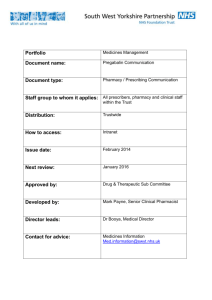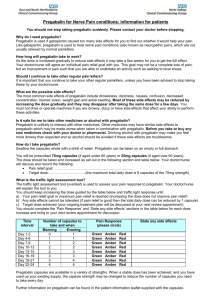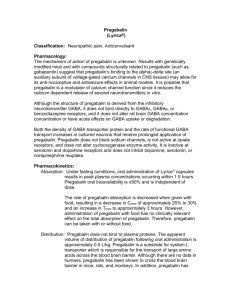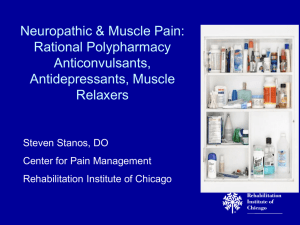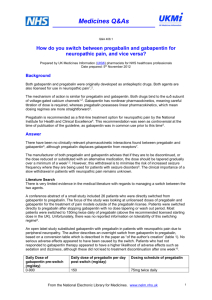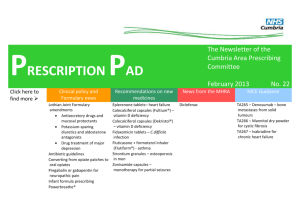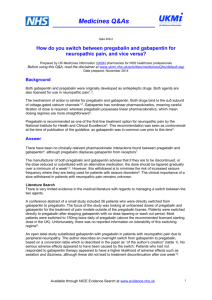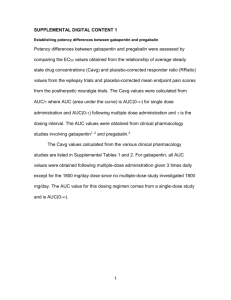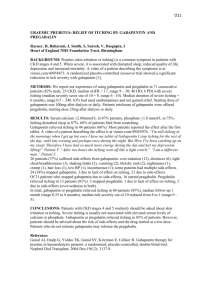Pregabalin Abuse amongst Opioid Substitution Treatment Patients
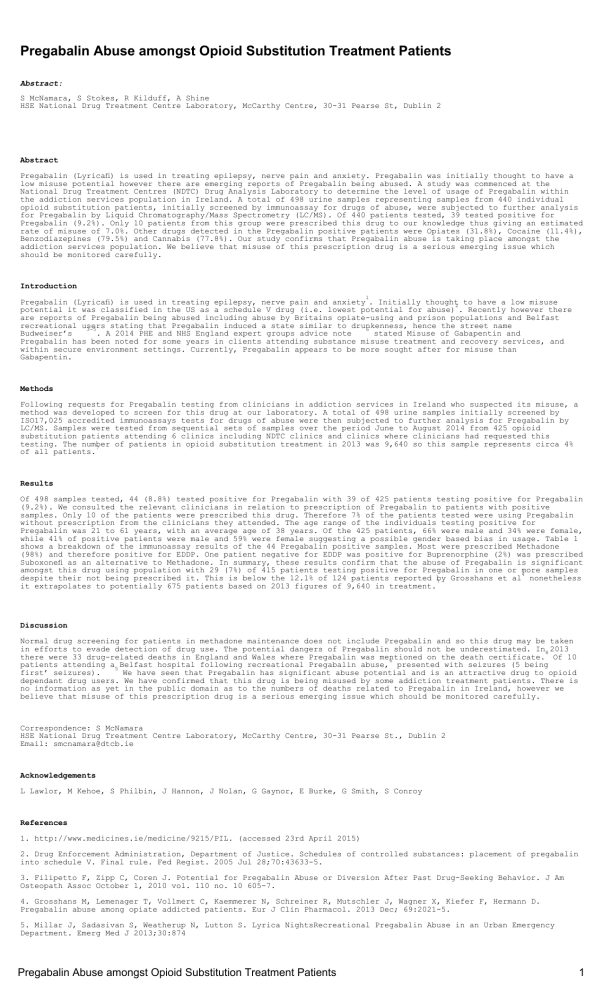
Pregabalin Abuse amongst Opioid Substitution Treatment Patients
Abstract:
S McNamara, S Stokes, R Kilduff, A Shine
HSE National Drug Treatment Centre Laboratory, McCarthy Centre, 30-31 Pearse St, Dublin 2
Abstract
Pregabalin (Lyricafi) is used in treating epilepsy, nerve pain and anxiety. Pregabalin was initially thought to have a low misuse potential however there are emerging reports of Pregabalin being abused. A study was commenced at the
National Drug Treatment Centres (NDTC) Drug Analysis Laboratory to determine the level of usage of Pregabalin within the addiction services population in Ireland. A total of 498 urine samples representing samples from 440 individual opioid substitution patients, initially screened by immunoassay for drugs of abuse, were subjected to further analysis for Pregabalin by Liquid Chromatography/Mass Spectrometry (LC/MS). Of 440 patients tested, 39 tested positive for
Pregabalin (9.2%). Only 10 patients from this group were prescribed this drug to our knowledge thus giving an estimated rate of misuse of 7.0%. Other drugs detected in the Pregabalin positive patients were Opiates (31.8%), Cocaine (11.4%),
Benzodiazepines (79.5%) and Cannabis (77.8%). Our study confirms that Pregabalin abuse is taking place amongst the addiction services population. We believe that misuse of this prescription drug is a serious emerging issue which should be monitored carefully.
Introduction
Pregabalin (Lyricafi) is used in treating epilepsy, nerve pain and anxiety
1
. Initially thought to have a low misuse potential it was classified in the US as a schedule V drug (i.e. lowest potential for abuse)
2
. Recently however there are reports of Pregabalin being abused including abuse by Britains opiate-using and prison populations and Belfast recreational users stating that Pregabalin induced a state similar to drunkenness, hence the street name
Budweiser’s
3-5
. A 2014 PHE and NHS England expert groups advice note
6
stated Misuse of Gabapentin and
Pregabalin has been noted for some years in clients attending substance misuse treatment and recovery services, and within secure environment settings. Currently, Pregabalin appears to be more sought after for misuse than
Gabapentin.
Methods
Following requests for Pregabalin testing from clinicians in addiction services in Ireland who suspected its misuse, a method was developed to screen for this drug at our laboratory. A total of 498 urine samples initially screened by
ISO17,025 accredited immunoassays tests for drugs of abuse were then subjected to further analysis for Pregabalin by
LC/MS. Samples were tested from sequential sets of samples over the period June to August 2014 from 425 opioid substitution patients attending 6 clinics including NDTC clinics and clinics where clinicians had requested this testing. The number of patients in opioid substitution treatment in 2013 was 9,640 so this sample represents circa 4% of all patients.
7
Results
Of 498 samples tested, 44 (8.8%) tested positive for Pregabalin with 39 of 425 patients testing positive for Pregabalin
(9.2%). We consulted the relevant clinicians in relation to prescription of Pregabalin to patients with positive samples. Only 10 of the patients were prescribed this drug. Therefore 7% of the patients tested were using Pregabalin without prescription from the clinicians they attended. The age range of the individuals testing positive for
Pregabalin was 21 to 61 years, with an average age of 38 years. Of the 425 patients, 66% were male and 34% were female, while 41% of positive patients were male and 59% were female suggesting a possible gender based bias in usage. Table 1 shows a breakdown of the immunoassay results of the 44 Pregabalin positive samples. Most were prescribed Methadone
(98%) and therefore positive for EDDP. One patient negative for EDDP was positive for Buprenorphine (2%) was prescribed
Suboxonefi as an alternative to Methadone. In summary, these results confirm that the abuse of Pregabalin is significant amongst this drug using population with 29 (7%) of 415 patients testing positive for Pregabalin in one or more samples despite their not being prescribed it. This is below the 12.1% of 124 patients reported by Grosshans et al
4
nonetheless it extrapolates to potentially 675 patients based on 2013 figures of 9,640 in treatment.
7
Discussion
Normal drug screening for patients in methadone maintenance does not include Pregabalin and so this drug may be taken in efforts to evade detection of drug use. The potential dangers of Pregabalin should not be underestimated. In 2013 there were 33 drug-related deaths in England and Wales where Pregabalin was mentioned on the death certificate.
8
Of 10 patients attending a Belfast hospital following recreational Pregabalin abuse,
6
presented with seizures (5 being first’ seizures).
5
We have seen that Pregabalin has significant abuse potential and is an attractive drug to opioid dependant drug users. We have confirmed that this drug is being misused by some addiction treatment patients. There is no information as yet in the public domain as to the numbers of deaths related to Pregabalin in Ireland, however we believe that misuse of this prescription drug is a serious emerging issue which should be monitored carefully.
Correspondence: S McNamara
HSE National Drug Treatment Centre Laboratory, McCarthy Centre, 30-31 Pearse St., Dublin 2
Email: smcnamara@dtcb.ie
Acknowledgements
L Lawlor, M Kehoe, S Philbin, J Hannon, J Nolan, G Gaynor, E Burke, G Smith, S Conroy
References
1. http://www.medicines.ie/medicine/9215/PIL. (accessed 23rd April 2015)
2. Drug Enforcement Administration, Department of Justice. Schedules of controlled substances: placement of pregabalin into schedule V. Final rule. Fed Regist. 2005 Jul 28;70:43633-5.
3. Filipetto F, Zipp C, Coren J. Potential for Pregabalin Abuse or Diversion After Past Drug-Seeking Behavior. J Am
Osteopath Assoc October 1, 2010 vol. 110 no. 10 605-7.
4. Grosshans M, Lemenager T, Vollmert C, Kaemmerer N, Schreiner R, Mutschler J, Wagner X, Kiefer F, Hermann D.
Pregabalin abuse among opiate addicted patients. Eur J Clin Pharmacol. 2013 Dec; 69:2021-5.
5. Millar J, Sadasivan S, Weatherup N, Lutton S. Lyrica NightsRecreational Pregabalin Abuse in an Urban Emergency
Department. Emerg Med J 2013;30:874
Pregabalin Abuse amongst Opioid Substitution Treatment Patients 1
6.
https://www.gov.uk/government/uploads/system/uploads/attachment_data/file/385791/PHE-NHS_England_pregabalin_and_gabapentin_advice_Dec_2014.pdf
(accessed on 23rd April 2015)
7. http://www.emcdda.europa.eu/data/treatment-overviews/Ireland (accessed on 14th July 2015)
8. http://www.ons.gov.uk/ons/search/index.html?newquery=pregabalin. (accessed on 23rd April 2015)
Comments:
